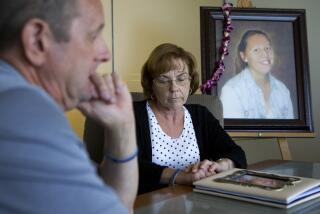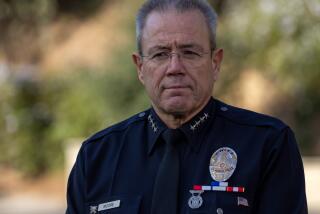COLUMN ONE : Policing the Police in S. Africa : Pathologist Jonathan Gluckman endures constant harassment in his lonely public battle against deadly detention abuse. The use of force is ‘out of control,’ he says, and shows no sign of abating.
JOHANNESBURG, South Africa — The story of Bethuel Maphumalo was sadly familiar. He surrendered into police custody as a healthy 31-year-old black man. Two days later, on the eve of his bail hearing, he was dead.
What happened? Well, the police said he “jumped through a window,” fell into a swimming pool and drowned. Later, they said he tried to escape, attacked a police officer twice his size, then fell into the pool, where he drowned--still in his handcuffs.
The only problem with the police story was that Maphumalo didn’t drown. He was strangled. And earlier last month, a Johannesburg magistrate found that police officer Henry Beukes, now a lieutenant, was “criminally liable” for Maphumalo’s death.
The case marked a small but important first victory for independent pathologist Jonathan Gluckman in his increasingly bitter, 8-month-old battle with the South African police over deaths in detention.
Gluckman says that police abuse of suspects is “out of control.” The police deny it, as they have for years.
Those denials, especially in the face of a rising tide of suspect deaths, have fueled widespread distrust of the police among black South Africans. Many blacks are convinced that officers find it easier to beat confessions out of suspects than investigate crime.
Last year, 210 suspects, most of them healthy young black men, died in police custody in South Africa, which has a population roughly equal to that of California. That was a 40% increase, and nearly half of those suspects died within hours of arrest, before they even made it to a police cell.
During his long career as a private pathologist, Gluckman, now 78, has conducted hundreds of autopsies on people who have died in police custody, among them Black Consciousness movement leader Steve Biko. Although usually hired by victims’ families, he gained a reputation for impartiality and became a highly respected member of the medical-legal Establishment.
Gluckman often presented his findings in court. But they were often ignored. And when the verdicts came down in favor of the police, as they usually did, he kept his mouth shut, assuring himself that the legal system was capable of healing itself.
But last year, Gluckman expressed his concerns about police misconduct in a private letter to President Frederik W. De Klerk, a man he greatly admires. Months went by, and Gluckman heard nothing.
Then, in July, the arrest and brutal killing of a teen-ager in Sebokeng Township prompted Gluckman to end his career-long silence. Of about 200 autopsies he has conducted over the years, he revealed, 90% of the victims had died at the hands of police.
Hernus Kriel, De Klerk’s minister of law and order, promised that the police would re-investigate each of Gluckman’s cases. Six months later, though, after a cursory look that involved no new investigations, Kriel concluded that Gluckman’s allegations were “false” and “most unfortunate.” (Kriel also denies that he had promised a more exhaustive probe.)
In several cases in which Kriel concluded that “police were not accountable” for deaths, the minister neglected to mention that his office had paid thousands of dollars in damages to families of those victims.
Since he went public, Gluckman has been harassed almost daily by anonymous telephone calls and letters. A few months ago, he found listening devices in the ceiling of his office and a tap on his phone. And yet he refuses to back down. His only regret, he said in an interview, “is that it has not changed the incidence rate one iota. It just goes on and on.”
South Africa’s police force has been accused for several decades of brutal questioning of suspects. One of the most notorious cases involved Biko, arrested in 1977, beaten, denied medical treatment and driven, handcuffed, in the back of a car for two days from Cape Town to Pretoria, where he died.
Gluckman, asked to join the state autopsy by Biko’s family, testified in that case, which was dramatized in the film “A Dry White Season.” But the magistrate found no one responsible for Biko’s death.
Human rights lawyers place most of the blame for the continuing high rate of deaths in custody on a police force that, in the assessment of an independent British inspector last year, relies too heavily on confessions “because there is precious little prospect of obtaining evidence by other means.” The police also protect their own and routinely turn down requests for independent investigations of misconduct.
But lawyers also blame the law itself, which allows magistrates to review deaths in custody without listening to all the evidence and authorizes police to use force to subdue prisoners and prevent escapes. A defense of “legal justification” is easy for a policeman to make in South African courts, where white judges predominate, especially when the victim is not alive to testify.
“Our judiciary has gone out of its way to find grounds of justification for assaults by police on suspects,” said Richard Spoor, a Johannesburg lawyer who has handled many cases involving police brutality.
Last year, 21 police officers were suspended in deaths of suspects and 17 were charged. (Among the 110,000 officers on the force, 876 were convicted of committing crimes while on duty last year.)
Of the dozens of cases disputed by Gluckman and the police, Bethuel Maphumalo’s was the first to come to court since the pathologist went public.
In December, 1990, Maphumalo turned himself in to police after learning that he was being investigated for a robbery. His attorney had assured Maphumalo that he would be freed on bail when he appeared in court two days later.
And yet officer Henry Beukes said Maphumalo tried to escape when the policeman left the interrogation room to answer the phone. When he began looking for the suspect in the station courtyard, Beukes testified, the 150-pound Maphumalo leaped from a corner and put his handcuffed hands around the neck of the 5-foot-5, 250-pound policeman.
A “terrific struggle” ensued, they fell into the pool, and Maphumalo drowned, Beukes said.
But Beukes’ story was contradicted by the autopsy. Both Gluckman and the state pathologist found the cause of death to be “manual strangulation.”
The magistrate, Carel de Lange, ruled that Beukes’ story was “pure fantasy” and found the policeman responsible. A few days later, Beukes was suspended, with pay, from the force. Now the attorney general, faced with the findings of that inquiry, must decide whether to prosecute.
“I’ve dealt with many of these cases,” Judge De Lange said later. “Most of the time you can’t find the policeman responsible because he acted in the execution of his duties. But now and then you find one.”
Human rights lawyers contend that the courts, in their rush to dispose of cases, often ignore autopsy results, especially in rural areas where a policeman’s word often is accepted without question.
That’s what happened in the case of 16-year-old Nixon Phiri. In 1989, Phiri and several other township youths were arrested near Carletonville, west of Johannesburg. During questioning, Phiri died of a sharp blow to the skull. One of Phiri’s fellow detainees said Phiri had been severely beaten during questioning. But that boy, Thomas Tshabalala, didn’t live to testify in court; he was killed by police two weeks later.
The police investigated Phiri’s death, concluding that the youth had suffered an epileptic seizure and fallen against a filing cabinet during questioning. Phiri had no history of epilepsy, but the police report concluded that all the officers in the unit “support this story.”
Gluckman conducted an autopsy on Phiri and found numerous abrasions and bruises on the body. The largest of three bruises on his skull was about the size of an audio cassette tape. “I’d say he was very badly beaten up,” Gluckman said.
The Phiri family attorney had written President De Klerk, asking for an independent judicial investigation. But De Klerk said that was unnecessary. “I am satisfied that the death of Nixon Phiri will be investigated . . . in an unbiased manner and that justice will prevail,” he wrote.
During a formal inquest last year, the magistrate ignored the state autopsy, which had detailed numerous bruises but stopped short of blaming the police. The magistrate ruled that Phiri had died of “unknown causes.”
The Phiri family’s attorney learned of the inquest in a letter, dated a day before the inquiry, that arrived a week later. Gluckman’s findings never made it into court.
Under pressure, the attorney general reopened Phiri’s case last week. A new inquest is under way, and Gluckman will testify this time.
The reasons behind Gluckman’s decision to go public, and to take on the police Establishment, are summed up by a small sign on the bulletin board of his Johannesburg office. It reads, “Good Men Have Only to Remain Silent for Evil to Prevail.”
“I’m no better and no worse than any of the state pathologists,” said Gluckman, who received his training in Britain and the United States. In fact, the findings of the state pathologists and Gluckman on individual cases often coincide. “I was just free to talk and they are not free,” he said.
Gluckman, a bespectacled man with thinning gray hair and a sharp wit, broke his public silence after an autopsy on Simon Mthimkulu, 19, who was arrested by police and was found dead a few hours later.
“It was so horrifying,” Gluckman recalled. “Here was a young boy--he could have been my son or grandson--who had done nothing. He was an onlooker. And police chasing car thieves had picked him up and beaten him to death. That finished me off.”
Gluckman says he never wanted to pick a fight with the government and still strongly supports De Klerk. But he remains troubled by police unwillingness to acknowledge the scale of the problem and by magistrates who dispatch cases with informal hearings and doctors in rural areas who conduct autopsies for the state without proper forensic training.
“It distresses me as a human being,” he said. “I just have a small practice, but I see so many cases. I have to wonder, ‘How many more are there out there?’ These poor black people in the rural areas, off the farm, are used to these deaths. The police take a man to the station and the next thing the family knows, he’s dead. They accept it as part of life. An act of God.”
As he spoke, Gluckman raised his arm to indicate several framed photographs of the pathologist on the steps of courthouses across South Africa. One shows Gluckman during the Biko inquiry. Another shows him after testifying in the case of a black suspect who jumped to his death from a high floor at the Johannesburg police station. The police had said that one was a suicide, and the judge agreed.
“Here’s a review of 25 years of high-profile cases that came to nothing,” Gluckman said. He paused, adding, “Just think of all the low-profile cases that no one even investigated.”
More to Read
Sign up for Essential California
The most important California stories and recommendations in your inbox every morning.
You may occasionally receive promotional content from the Los Angeles Times.











